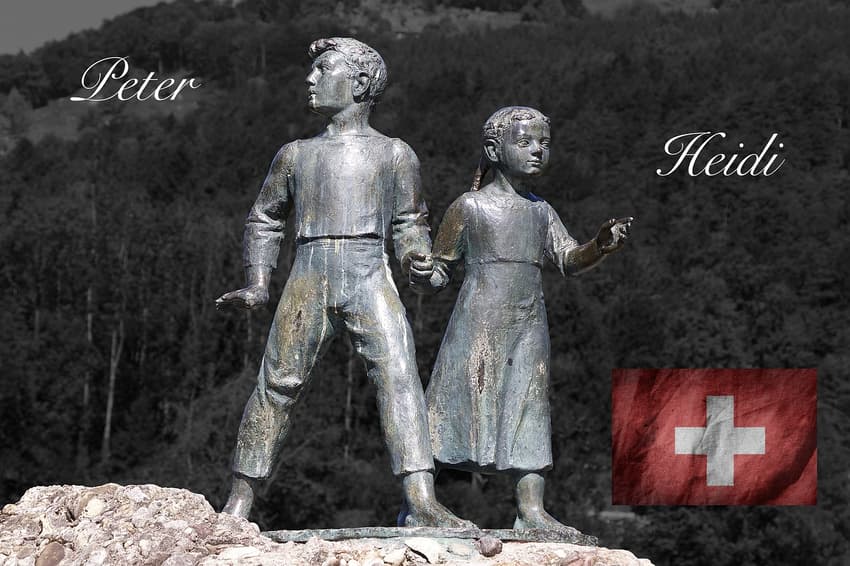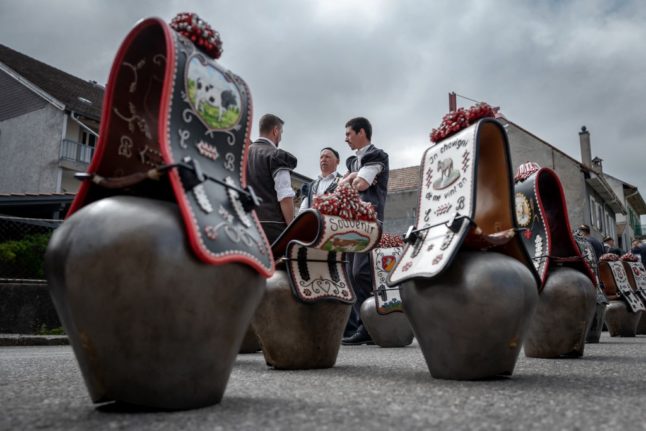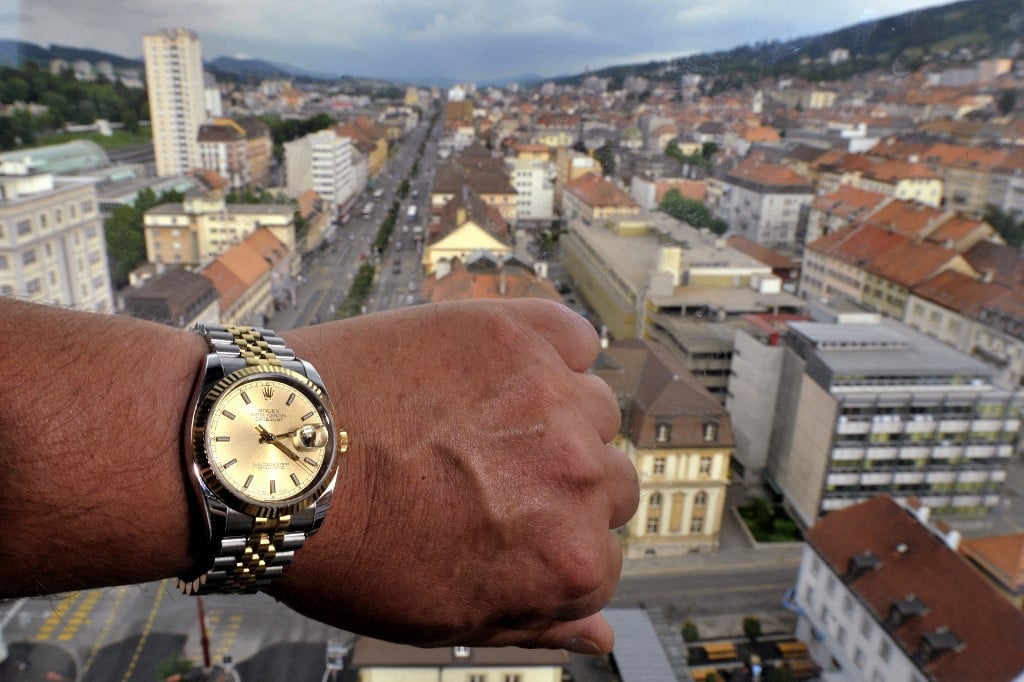Which are the four most 'Swiss' regions of Switzerland?

This question may sound confusing as you could answer that all parts of the country are ‘Swiss’ — and you’d be right, of course. However, some areas have more innate ‘Swissness’ than others.
Because of its linguistic and cultural diversity, which is unique in Europe (no other country has four official languages), it may be difficult to define what exactly is typically Swiss.
Is it the German speaking region, the French one, or the Italian part of the country? After all, they all have an equal claim to Swissness.
It is, indeed, somewhat of a conundrum, but let’s look at it this way: if you define what ‘Swissness’ means to general public, especially people living abroad, then identifying the most Swiss areas is a lot easier.
For instance:
Gruyère
Many countries produce cheese, but in Switzerland it has an almost mystical aura: Switzerland without its cheeses wouldn’t be Switzerland.
There are many regions in the country where distinctly different cheeses are made — including Emmental and Appenzeller, both named after the cantons of their origin — but the most famous one is arguably Gruyère.
While a US court recently decided that Gruyère is a “common” cheese and the Swiss can’t claim it as their own, the fact is that it has been produced in the Gruyère region of canton Fribourg since the 12th century — and continues to be manufactured there to this day.
For this reason, the area can be considered as typically Swiss — not only the region itself, but also the stunning, hilltop medieval village, which overlooks the artisanal dairies where the cheese is made, as well as pastures where cows which provide milk for it graze.

Gruyère can be considered as typically Swiss. Photo by Fabrice COFFRINI / AFP
La Chaux-de-Fonds
If you identify Switzerland with its watches, then for you this town and its immediate area will be the essence of Swissness
Located in the Jura hills, La Chaux-de-Fonds and surrounding towns are closely associated with watches.
According to UNESCO, which designated it a Heritage Site, the area has long owed its existence to watchmaking industry.
Residential housing and workshops are intermingled, which reflects the needs of the local watchmaking culture that dates to the 17th century and is still alive today,” the organisation points out.

La Chaux-de-Fonds. Photo by FABRICE COFFRINI / AFP
Appenzell and Glarus
There are few things (except the other ones mentioned in this article) that are more Swiss than direct democracy.
It can be observed everywhere in the country four times a year, when national or local referendums are taking place.
But there are only two places where the old-fashioned, grass-roots system is still practiced just as it was 600 years ago: in Appenzell and Glarus.
In those two cantons, during once-yearly Landsgemeinde (open-air assembly) the citizens still vote by show of hands.
The Appenzell Landesgemeinde will take place on April 30th this year, and the Glarus one on May 7th.
READ ALSO: 'Pure democracy': What is Switzerland's Landsgemeinde (open-air assembly)?
Maienfeld
If you are looking for the ultimate ‘Swiss experience’, then the village of Maienfeld in Graubünden, is just up your (v)alley
This is where Heidi, the fictional heroine of Johanna Spyri’s book, is supposed to have lived, with her grandfather, friend Peter, and many goats.
Even though the ‘quintessential Swiss girl’ might, in fact, have come to Maienfeld from Germany, this tidbit has not stopped the tourism board’s from promoting this village as Heidi’s homeland.
Do you have suggestions of the most Swiss parts of the country? If so, let us know by emailing [email protected]
Comments
See Also
Because of its linguistic and cultural diversity, which is unique in Europe (no other country has four official languages), it may be difficult to define what exactly is typically Swiss.
Is it the German speaking region, the French one, or the Italian part of the country? After all, they all have an equal claim to Swissness.
It is, indeed, somewhat of a conundrum, but let’s look at it this way: if you define what ‘Swissness’ means to general public, especially people living abroad, then identifying the most Swiss areas is a lot easier.
For instance:
Gruyère
Many countries produce cheese, but in Switzerland it has an almost mystical aura: Switzerland without its cheeses wouldn’t be Switzerland.
There are many regions in the country where distinctly different cheeses are made — including Emmental and Appenzeller, both named after the cantons of their origin — but the most famous one is arguably Gruyère.
While a US court recently decided that Gruyère is a “common” cheese and the Swiss can’t claim it as their own, the fact is that it has been produced in the Gruyère region of canton Fribourg since the 12th century — and continues to be manufactured there to this day.
For this reason, the area can be considered as typically Swiss — not only the region itself, but also the stunning, hilltop medieval village, which overlooks the artisanal dairies where the cheese is made, as well as pastures where cows which provide milk for it graze.

La Chaux-de-Fonds
If you identify Switzerland with its watches, then for you this town and its immediate area will be the essence of Swissness
Located in the Jura hills, La Chaux-de-Fonds and surrounding towns are closely associated with watches.
According to UNESCO, which designated it a Heritage Site, the area has long owed its existence to watchmaking industry.
Residential housing and workshops are intermingled, which reflects the needs of the local watchmaking culture that dates to the 17th century and is still alive today,” the organisation points out.

Appenzell and Glarus
There are few things (except the other ones mentioned in this article) that are more Swiss than direct democracy.
It can be observed everywhere in the country four times a year, when national or local referendums are taking place.
But there are only two places where the old-fashioned, grass-roots system is still practiced just as it was 600 years ago: in Appenzell and Glarus.
In those two cantons, during once-yearly Landsgemeinde (open-air assembly) the citizens still vote by show of hands.
The Appenzell Landesgemeinde will take place on April 30th this year, and the Glarus one on May 7th.
READ ALSO: 'Pure democracy': What is Switzerland's Landsgemeinde (open-air assembly)?
Maienfeld
If you are looking for the ultimate ‘Swiss experience’, then the village of Maienfeld in Graubünden, is just up your (v)alley
This is where Heidi, the fictional heroine of Johanna Spyri’s book, is supposed to have lived, with her grandfather, friend Peter, and many goats.
Even though the ‘quintessential Swiss girl’ might, in fact, have come to Maienfeld from Germany, this tidbit has not stopped the tourism board’s from promoting this village as Heidi’s homeland.
Do you have suggestions of the most Swiss parts of the country? If so, let us know by emailing [email protected]
Join the conversation in our comments section below. Share your own views and experience and if you have a question or suggestion for our journalists then email us at [email protected].
Please keep comments civil, constructive and on topic – and make sure to read our terms of use before getting involved.
Please log in here to leave a comment.